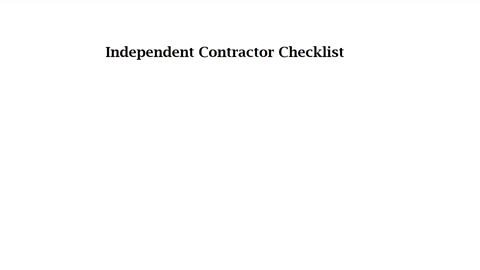What You Need to Know About Hiring an Independent Contractor in Massachusetts
Independent Contractors in Massachusetts - A Guide for Small Business OwnersAs a small business owner, payroll costs can often feel overwhelming. Unemployment taxes, employment taxes, and workers' compensation insurance can make hiring employees a daunting prospect. That's why many business owners in Massachusetts consider hiring workers as independent contractors instead of traditional employees.
However, it's crucial to understand that classifying workers as independent contractors isn't as simple as it might seem. True independent contractor status in Massachusetts is subject to strict legal limitations. In reality, many individuals categorized as independent contractors should legally be classified as employees. Failing to get this classification right can expose your business to significant legal risks and potential lawsuits. This page explores the essential rules and best practices for hiring independent contractors in Massachusetts. Employee or Independent Contractor: The RulesIn Massachusetts, the general rule is that most workers should be considered employees rather than independent contractors. To be classified as an independent contractor legally, three criteria must be met:
Understanding the RisksIf a worker challenges their independent contractor status and succeeds, your business may face a lawsuit. In such cases, the court could be required to award three times the actual damages, along with reimbursement for the worker's costs and reasonable attorney's fees. Potential damages could include:
|
We're Here to Help.OR
|
Wondering About Using Independent Contractors in Your Business?
Our Solutions Roadmap is a quick and easy way to share the details of what you are facing and receive preliminary feedback from a member of our team. Use the button below to get started- it is 100% confidential and 100% free.
Hiring an Independent Contractor: Are You Really Saving Money?
While the additional costs of hiring employees are real, it's essential to calculate the potential costs of misclassification. These costs include your share of employment taxes, unemployment tax contributions, workers' compensation insurance, and administrative payroll processing fees.
The risk of a worker successfully challenging their independent contractor status can lead to significant legal expenses and damages. You must also remember to multiply that risk times three, because a successful challenge to independent contractor classification will result in triple damages under the Wage Act.
The risk of a worker successfully challenging their independent contractor status can lead to significant legal expenses and damages. You must also remember to multiply that risk times three, because a successful challenge to independent contractor classification will result in triple damages under the Wage Act.
Hiring an Independent Contractor: Best Practices
To minimize your risk when hiring independent contractors, consider implementing the following best practices:
- Use a Written Contract: A written contract can clarify important aspects of the independent contractor relationship, such as the worker's discretion in performing their job and their ability to provide services to others.
- Ensure Adequate Compensation: Pay your independent contractors an amount that at least meets the statutory minimum wage, even if they are not subject to minimum wage laws. This can protect you from minimum wage law liability in case of a challenge.
- Implement Invoicing and Reporting Systems: Require independent contractors to submit invoices and report on their work progress. This helps establish their independence and provides documentation for business purposes.
- Address Concerns Promptly: If an independent contractor raises questions or concerns about their classification, seek legal advice immediately to prevent potential retaliation claims.
Conclusion
While hiring independent contractors can seem like a cost-effective solution for small businesses, it's crucial to comply with Massachusetts law and avoid misclassification. The potential legal consequences of misclassifying workers can far outweigh the initial cost savings. Understanding the rules and best practices for hiring independent contractors is essential for the long-term success and legal compliance of your business.
Meet Our Employment Lawyers

Emily Smith-Lee is the owner and founder of slnlaw. She is a 1996 graduate of Boston College Law School. She was previously a partner at the Boston office of a large international firm, where she worked for thirteen years before starting the firm that became slnlaw in 2009. She has been recognized as Massachusetts Superlawyer each year since 2013, and in 2018 earned recognition as one of Massachusetts Lawyers Weekly's Lawyers of the Year. She has written a book on employment law: Rules of the Road, What You Need to Know About Employment Laws in Massachusetts, and helped thousands of clients on both the employee and employer side with severance and non compete review and negotiation, wage and hour, discrimination and retaliation disputes, and advice about employment law generally.

Rebecca Rogers: Rebecca is a 2006 graduate of Boston College Law School, and has worked with slnlaw since 2013. She previously worked as an intellectual property litigation attorney for Fish & Richardson in Boston, Massachusetts, and clerked for the Massachusetts Supreme Judicial Court. Rebecca has helped clients with wage and hour disputes, employment discrimination and retaliation claims, review and negotiation of severance and non compete agreements, and advice to both employees and employers about navigating complex employment situations.

Jenna Ordway: Jenna is a 2013 graduate of Quinnipiac Law School, and also earned an LLM in Taxation from Boston University in 2015. She has been affiliated with slnlaw since 2011, first as a law clerk and then as an attorney. Jenna has been recognized since 2019 as a "Rising Star" by Massachusetts Superlawyers. Jenna has helped clients with review and negotiation of severance and non compete agreements, wage and hour disputes, employment and discrimination claims, and advice to small business owners about employment law and other business matters.

Elijah Bresley: Eli is a 2014 graduate of Seton Hall Law school, and has worked with slnlaw since 2020. He previously worked for a boutique employment law firm outside of Boston, and then for the Labor and Employment department of a large Boston firm. He also spent a year clerking for the judges of the Superior Court in Hartford, Connecticut. Eli has helped clients on the employee and employer side with all varieties of employment law issues, including employment discrimination, retaliation, and wage and hour issues, litigation in MCAD and state and federal courts, and advising employers about employment policies and practices.

Sharleen Tinnin: Sharleen is a 2010 graduate of Northeastern University School of Law, and has been with slnlaw since 2023. Prior to joining slnlaw, she worked with King, Tilden, McEttrick & Brink, P.C. on complex civil litigation matters. She previously worked for the United States Department of Justice, and received an "Excellence in Justice" award in 2017. Sharleen has helped clients with wage and hour, discrimination and retaliation disputes, review and negotiation of severance agreements, and litigation in MCAD and state and federal courts on employment related issues.
How We Can Help
We have helped many small business owners assess their employment practices and their risk. We can help you structure your hiring in a way that minimizes risk, and respond in the event of a problem. You can use the button below to schedule a call back from a member of our team, or give us a call at 781-784-2322.






